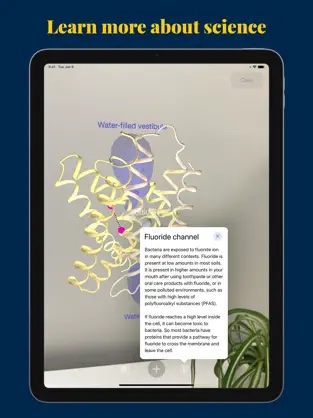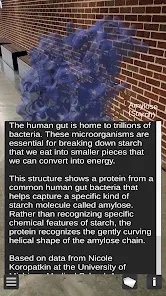In May 2023, LSA Technology Services launched a new application, MacromoleculAR, that provides an interactive augmented reality (AR) experience for users to view various molecular models.
The app was developed for Randy Stockbridge, an associate professor in the Department of Molecular, Cellular, and Developmental Biology (MCDB). And it's not only great for the students in her course, but for the general public as well. Users can place models in the real world around them and view additional information about them.


Images of the application on iPhone (left) and Android
(right).
LSA Technology Services first partnered with Randy in 2020. Unfortunately due to the COVID-19 pandemic the project was delayed.
When the LSA TS Research Computing team (Abbey Roelofs, Nathan Fallahi, Michael Egan, Tyler Slouf, and Kevin Murray) picked up the project again in late 2022, they met with Randy to go over the existing state of the app and determine what updates would need to be made.
Stockbridge wanted an iOS application, which would be built using Apple's ARKit. With the team's past experience with AR in Unity (a software suite for building AR-rich applications), they realized they could also build a version of the app for Android, thereby extending the original project scope.
The team originally planned to include an AR feature where users could scan various markers placed around a museum to view and "collect" AR models of molecules. This feature was, however, discarded in the current version of the app in favor of a simpler interface that was more user-friendly.
Throughout the fall and winter the team provided progress reports to Randy, received feedback, and iterated on their work. By March 2023, a beta version of the app was released on Apple's TestFlight for internal testing. In May 2023 both iOS and Android versions were released publicly. It is available through the Apple App Store and the Google Play store.
"Abbey and Nathan were extremely knowledgeable, and helped me shape my ideas into this final product. It was a great experience working with them, and I'm excited to use the app for public outreach and in my undergraduate biochemistry class," Randy said.